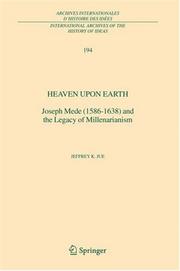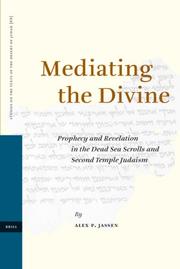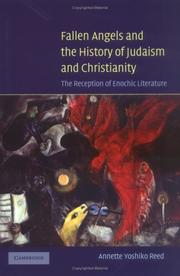| Listing 1 - 5 of 5 |
Sort by
|
Periodical
Year: 2005 Publisher: [São Bernardo do Campo] : Grupo Oracula de Pesquisa em Apocalíptica Judaica e Cristã do Programa de Pós-Graduação em Ciências da Religião da Universidade Metodista de São Paulo,
Abstract | Keywords | Export | Availability | Bookmark
 Loading...
Loading...Choose an application
- Reference Manager
- EndNote
- RefWorks (Direct export to RefWorks)
Apocalyptic literature --- Church history --- Judaism --- Christianity --- Mysticism --- Bible --- Bible. --- Study and teaching --- 30-600 --- Brazil. --- Littérature apocalyptique --- Église --- Judaïsme --- Christianisme --- Mysticisme --- Histoire --- Étude et enseignement

ISBN: 1402042922 9781402042928 9048170982 9786610612680 1280612681 1402042930 Year: 2006 Volume: 194. Publisher: Dordrecht Springer
Abstract | Keywords | Export | Availability | Bookmark
 Loading...
Loading...Choose an application
- Reference Manager
- EndNote
- RefWorks (Direct export to RefWorks)
1.i THE HISTORY OF BRITISHAPOCALYPTICTHOUGHT The study of early modern Britain between the Reformation of the 1530s and the Wars of the Three Kingdoms of the 1640s has undergone a series of historiographical revisions. The dramatic events during that century were marked by a religious struggle that produced a Protestant nation, divided internally, yet clearly opposed to Rome. Likewise the political environment instilled a sense of responsible awareness regarding the administration of the realm and the defense 1 of constitutional liberty. Whig Historians from the nineteenth century described 2 these changes as a “Puritan Revolution.” Essentially this was England’s inevitable 3 march towards enlightenment as a result t of religious and political maturation. Subsequent Marxist historians attributed these radical changes to socio-economic 4 factors. Britain was witnessing the decline of the medieval feudal system and the rise of a new capitalist class. Both of these early views claimed that brewing social, political and economic unrest culminated in extreme radical action. More recently, beginning in the 1980s, new studies appeared that began to challenge these old assumptions. Relying on careful archival research, many of these studies discarded the former conception of this period as “revolutionary”, instead 5 arguing that the Reformation was in fact a gradual and unpopular process. In 1 Margo Todd (ed.) Reformation to Revolution: Politics and Religion in Early Modern England (London and New York, 1995), p. 1. 2 S. R. Gardiner, The First Two Stuarts and the Puritan Revolution (London, 1876).
Millennialism --- Apocalyptic literature --- Millénarisme --- Littérature apocalyptique --- History --- History and criticism --- Histoire --- Histoire et critique --- Mede, Joseph, --- Great Britain --- Grande-Bretagne --- Church history --- Histoire religieuse --- Millennialism. --- Mede, Joseph. --- Philosophy --- Christianity --- Philosophy & Religion --- Religion --- Millénarisme --- Littérature apocalyptique --- EPUB-LIV-FT LIVPHILO SPRINGER-B --- Amillennialism --- Chiliasm --- Millenarianism --- Millennianism --- Postmillennialism --- Premillennialism --- Mead, Joseph, --- Meade, --- Meade, Joseph, --- Medus, Josephus, --- Religion. --- History. --- Philosophy. --- Religious Studies. --- Religious Studies, general. --- Philosophy, general. --- History, general. --- Mental philosophy --- Humanities --- Annals --- Auxiliary sciences of history --- Religion, Primitive --- Atheism --- God --- Irreligion --- Religions --- Theology --- Dispensationalism --- Fundamentalism --- Millennium (Eschatology) --- Mede, Joseph --- England --- History of doctrines --- 17th century --- Philosophy (General). --- Millennialism - England --- Millennialism - New England --- Mede, Joseph, - 1586-1638
Book
ISSN: 15707350 ISBN: 9789004167308 9004167307 9786612399022 1282399020 9047441958 Year: 2009 Volume: 9 Publisher: Leiden ; Boston : Brill,
Abstract | Keywords | Export | Availability | Bookmark
 Loading...
Loading...Choose an application
- Reference Manager
- EndNote
- RefWorks (Direct export to RefWorks)
From the eighth century onwards, Christians living under Islam have produced numerous apologetic and polemical works, aimed at proving the continuing validity of Christianity. Among these is the Legend of Sergius Baḥīrā, which survives in two Syriac and two Arabic versions, and appears here in edition and translation. Being a counterhistory of Islam, it reshapes early Muslim traditions about a monk recognizing Muḥammad as the final Prophet by turning this monk into Muhammad’s tutor and co-author of the Qur’an. In response to Muslim triumphalist propaganda, it portrays Islam’s political power as predestined but finite and unrelated to its religious message. This feature sets the legend apart from similar Christian accounts of the origin of Islam, East and West, which are reviewed in this study as well.
Apologetics --- Apocalyptic literature --- Christianity and other religions --- Islam --- Apologétique --- Littérature apocalyptique --- Christianisme --- History --- History and criticism. --- Relations --- Christianity --- History. --- Histoire --- Histoire et critique --- Legend of Bahira. --- History and criticism --- Legend of Bāḥīrā --- Legend of Baḥīrā. --- Apologétique --- Littérature apocalyptique --- Legend of Baḥīrā. --- Christendom. --- Biographie. --- Christentum. --- Interreligiöse Beziehung. --- Judentum. --- Baḥīrā. --- Baḥīrā-Legende. --- Legend of Sergius Baḥīrā --- Legend of Beḥīrā --- Baḥīrā-Legende --- Apocalypse of Baḥīrā --- Apocalypse de Serge-Bahira --- Geschichte 800-850. --- Apologetics - History - Middle Ages, 600-1500 --- Apocalyptic literature - History and criticism --- Christianity and other religions - Islam - History --- Islam - Relations - Christianity - History

ISSN: 01699962 ISBN: 9789004158429 9004158421 9786611921453 1281921459 9047420616 9789047420613 9781281921451 Year: 2007 Volume: v. 68 Publisher: Leiden Brill
Abstract | Keywords | Export | Availability | Bookmark
 Loading...
Loading...Choose an application
- Reference Manager
- EndNote
- RefWorks (Direct export to RefWorks)
This book is a comprehensive treatment of prophecy and revelation in the Dead Sea Scrolls. It begins by analyzing the re-presentation of the classical prophets and their revelatory experience in an attempt to identify how prophecy and revelation was reconceptualized in the Dead Sea Scrolls in dialogue and in contrast with received biblical models. This work then examines the direct evidence in the Dead Sea Scrolls regarding ongoing prophetic activity at Qumran and in related segments of Second Temple Judaism. This study argues that the Dead Sea Scrolls bear witness to a transformed prophetic tradition active at Qumran and in Second Temple Judaism. Topics treated include the relationship of prophecy to scriptural interpretation, wisdom, and law, and eschatological prophecy.
Prophecy --- Judaism --- 229*319 --- 229*319 Qumran en het jodendom --- Qumran en het jodendom --- Forecasting --- Hellenistic Judaism --- Judaism, Hellenistic --- History --- Dead Sea scrolls. --- Jerusalem scrolls --- ʻAin Fashka scrolls --- Jericho scrolls --- Scrolls, Dead Sea --- Qumrân scrolls --- Rękopisy z Qumran --- Shikai bunsho --- Megilot Midbar Yehudah --- Dodezee-rollen --- Kumránské rukopisy --- Documentos de Qumrán --- Textos de Qumrán --- Rollos del Mar Muerto --- Manuscritos del Mar Muerto --- Manuscrits de la mer Morte --- Dödahavsrullarna --- Kumranin kirjoitukset --- Kuolleenmeren kirjoitukset --- Qumranhandskrifterna --- Qumranin kirjoitukset --- Qumran Caves scrolls --- Prophétie --- Judaïsme --- Histoire --- Dode-Zeerollen. --- Jodendom. --- Openbaringen. --- Profetieën. --- Prophétie --- Manuscrits de la Mer Morte --- Judaïsme --- Littérature apocalyptique --- Révélation --- Antiquité --- 586 av. J.-C.-210 (Période postexilique)

ISBN: 0521853788 9780521853781 9780511345227 0511345224 9780511343278 0511343272 9780511351815 051135181X 9780511499104 0511499108 1281108553 9786611108557 1139131443 0511344880 0511344503 0511344112 9781281108555 6611108556 9781139131445 9780511344886 9780511344503 9780511344114 Year: 2005 Publisher: Cambridge Cambridge university press
Abstract | Keywords | Export | Availability | Bookmark
 Loading...
Loading...Choose an application
- Reference Manager
- EndNote
- RefWorks (Direct export to RefWorks)
This book considers the early history of Jewish-Christian relations focussing on traditions about the fallen angels. In the Book of the Watchers, an Enochic apocalypse from the third century BCE, the 'sons of God' of Gen 6:1–4 are accused of corrupting humankind through their teachings of metalworking, cosmetology, magic, and divination. By tracing the transformations of this motif in Second Temple, Rabbinic, and early medieval Judaism and early, late antique, and Byzantine Christianity, this book sheds light on the history of interpretation of Genesis, the changing status of Enochic literature, and the place of parabiblical texts and traditions in the interchange between Jews and Christians in Late Antiquity and the early Middle Ages. In the process, it explores issues such as the role of text-selection in the delineation of community boundaries and the development of early Jewish and Christian ideas about the origins of evil on the earth.
Apocalyptic literature --- Angels. --- Christian literature, Early. --- Christianity and other religions --- Judaism --- Church history --- Littérature apocalyptique --- Anges --- Littérature chrétienne primitive --- Christianisme --- Judaïsme --- Eglise --- History and criticism. --- Judaism. --- Relations --- Christianity. --- Histoire et critique --- Histoire --- Ethiopic book of Enoch VI-XXXVI --- Bible. --- Criticism, interpretation, etc. --- 229*209 --- -Angels --- Christian literature, Early --- -Judaism --- -Church history --- -Angelology --- Cherubim --- Cherubs (Spirits) --- Divine messengers --- Seraphim --- Spirits --- Literature, Apocalyptic --- Literature --- Christianity --- Ecclesiastical history --- History, Church --- History, Ecclesiastical --- History --- Jews --- Religions --- Semites --- Syncretism (Christianity) --- Early Christian literature --- Patristic literature --- I Henoch (Ethiopische Henoch) --- History and criticism --- -Christianity --- Religion --- -Bible. --- Be-reshit (Book of the Old Testament) --- Bereshit (Book of the Old Testament) --- Bytie (Book of the Old Testament) --- Chʻangsegi (Book of the Old Testament) --- Genesis (Book of the Old Testament) --- Sifr al-Takwīn --- Takwīn (Book of the Old Testament) --- Book of watchers --- -I Henoch (Ethiopische Henoch) --- 229*209 I Henoch (Ethiopische Henoch) --- Anges. --- Littérature chrétienne primitive. --- Église --- RELIGION --- Apocalyptic literature. --- Interfaith relations. --- Histoire et critique. --- Judaïsme. --- Christianisme. --- Biblical Studies. --- Primitive and early church. --- Livre d'Hénoch (éthiopien). --- Ethiopic book of Enoch VI-XXXVI. --- Critique, interprétation, etc. --- 30-600. --- Christian literature, early. --- Biblical studies. --- Littérature apocalyptique --- Littérature chrétienne primitive --- Judaïsme --- Angels --- Apostolic Church --- Church, Apostolic --- Early Christianity --- Early church --- Primitive and early church --- Primitive Christianity --- Fathers of the church --- Great Apostasy (Mormon doctrine) --- Angelology --- Relations&delete& --- Brotherhood Week --- Arts and Humanities
| Listing 1 - 5 of 5 |
Sort by
|

 Search
Search Feedback
Feedback About UniCat
About UniCat  Help
Help News
News